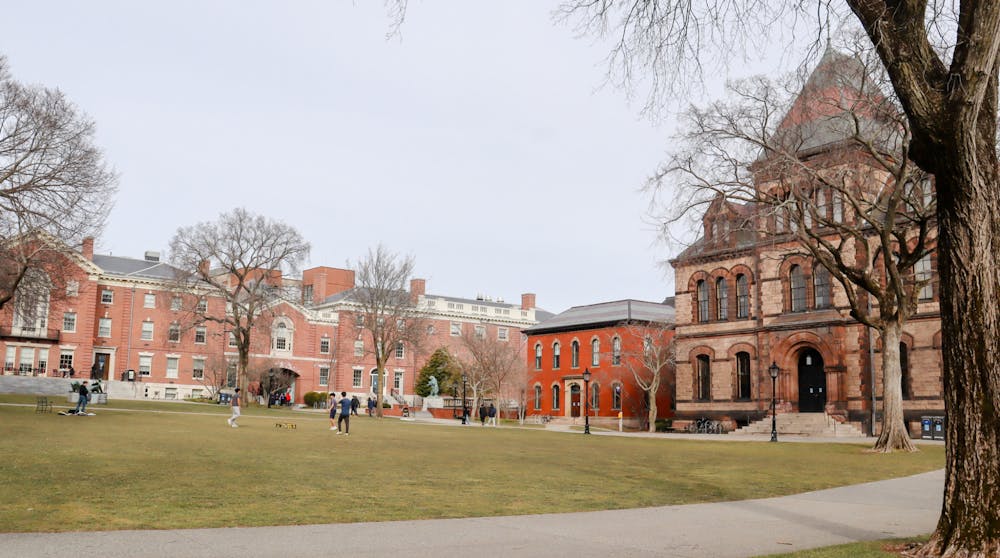With the future of race-conscious college admissions uncertain due to two U.S. Supreme Court cases with rulings set for this summer, the University is preparing to maintain a diverse student body without affirmative action, Associate Provost for Enrollment Logan Powell said at Tuesday’s faculty meeting.
The two cases the Supreme Court will rule on later this year were brought by a group called Students for Fair Admissions against Harvard University and the University of North Carolina.
Addressing the premise of SFFA’s case against Harvard, Powell provided data from the Harvard arguments which showed through “counterfactual research” that removing the consideration of race in admissions would result in a significant decrease in students from historically under-represented racial backgrounds. Cited by Powell, Harvard’s research indicated that the population of African-American students at the school would be halved, the Hispanic population would drop from 14% to 9% and the white student population would see a considerable increase.
“In our own analysis, this is also what would happen at Brown,” Powell said. “So what do we do, what comes next?”
Powell explained that Brown is preparing to ensure that its recruitment and yield processes — in which the University convinces admitted regular decision students to attend Brown — will continue to lead to the composition of a racially diverse class if affirmative action is struck down by the Supreme Court.
“Institutions of higher education, including Brown, need to take very specific and purposeful steps” to address potential outcomes of the Supreme Court’s affirmative action rulings, President Christina Paxson P’19 said at the meeting.
“We’re not just sitting on our hands waiting for the decision to come down,” Powell said. “We’re doing anything and everything that we possibly can.”
Powell explained that while the University expects the Supreme Court to rule that race can no longer be a factor in applicant selection, the administration is hopeful that the Supreme Court’s ruling will still allow colleges to recruit and conduct their yield processes while considering racial identity. To increase diversity through recruitment and enrollment yield, Powell explained that the University is “broadening (its) outreach.”
“For example, we’re traveling with Howard University to 15 cities in the south and southwest,” Powell said. “Our hope is that by expanding the pipeline of really talented students from diverse backgrounds, and then also working hard on the yield end, that we’ll be able to minimize the damage that would be done.”
Powell added that in every example found by the University of institutions excluding race in admissions, the institutions “do not get back to where they were when they operated in a race-conscious system.”
Interim Dean of the Graduate School Thomas Lewis also said that “holistic review” will be “crucial” to the graduate school’s response to potential legal changes in their ability to practice race-conscious admissions, as the graduate school intends to continue its focus on diversity.
“I can give you my promise that Brown will remain firmly committed to advancing diversity and inclusion on our own terms,” Paxson said. “This is the ideal that we aspire to.”
Powell also assured the faculty that the University will continue its dedication to campus diversity.
“One of the things I’m most proud of is that as the applicant pool has grown, our academic standards have risen,” Powell said at the meeting. “At the same time, we’ve been able to enroll increasingly diverse classes.”
Forty-five percent of admitted students to the class of 2017 were students of color, whereas 55% of admitted students to the class of 2025 — the last class for which the University shared data about the racial identity of admitted students — were students of color.
At the meeting, Paxson also discussed challenges within a “shifting national landscape” of higher education.
We’re “seeing a discourse in the media and in politics in which diversity, equity and inclusion efforts have been … inaccurately and possibly cynically redefined as universities’ attempts to indoctrinate students to adhere to specific political agendas,” Paxson said. “This, to me, is very, very concerning.”
Paxson said that while the University exists as a private college in a “fairly liberal state,” the University has a stake in diversity policy affecting “children across the country, who are the Brown students of the future.”

Sofia Barnett is a University News editor overseeing the faculty and higher education beat. She is a junior from Texas studying history and English nonfiction and enjoys freelancing in her free time.





